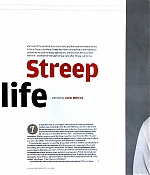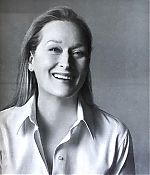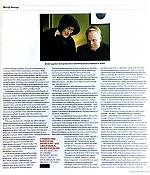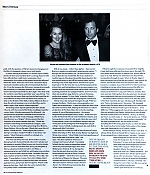|
Simply Streep is your premiere source on Meryl Streep's work on film, television and in the theatre - a career that has won her the praise to be one of the world's greatest working actresses. Created in 1999, we have built an extensive collection to discover Miss Streep's body of work through articles, photos and videos. Enjoy your stay.
|
|
Streep Life
The Independent ·
January 24, 2009
· Written by James Mottram
|
|
Tags
|
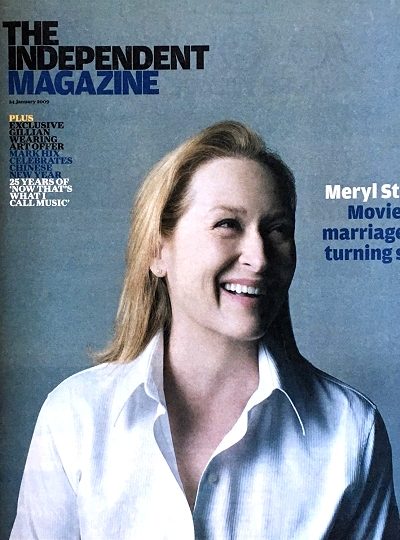
She’s one of the greatest stars of our time, and the most nominated actress in Oscar history. But Meryl Streep has never surrendered to the Hollywood system. As her 60th birthday approaches, she discusses her acclaimed new film – and how she manages to stay sane after 30 years at the top
It’s just after 10am in Los Angeles. Meryl Streep is a long way from her comfort zone. In the belly of the Beverly Hills beast, as it were, she arrives for our encounter, in a 14th-floor suite in the Four Seasons hotel, just a few minutes behind schedule. Based on the East Coast for the majority of her life, she only ever lived here for four years – and found it an unsettling experience. Maybe it was too much like living round the corner from the office. Or, more likely, it’s that Streep never was (or will be) an industry player. “Hollywood to me is what it is to you,” she admits. “It’s something other than what I am. I sit outside it.” It’s not that she’s superior or sneering. It’s just that, with four children and a husband of 30 years to contend with, the fripperies of Hollywood are not a major part of her world. Everything about Streep suggests pragmatism, not excess. Take her understated dress sense: today it’s blue jeans and a low-cut forest-green blouse. Her blonde hair is tied back, revealing a pair of gold-hoop earrings, and she’s wearing a pair of black-rimmed glasses that lend her the look of a headmistress when she peers at you. Evidently her time spent playing the Anna Wintour-like fashionista in The Devil Wears Prada did not rub off. “I live simply,” she shrugs. “I don’t buy a lot of fashion!” I must admit the idea of interviewing Streep is quite intimidating. There are those record-breaking numbers: 14 Oscar nominations, two wins; 23 Golden Globe nominations, six wins; 11 Bafta nominations, one win. No other actor comes close. Then there are the films: heavyweight dramas, like the two she won her Oscars for, Sophie’s Choice and Kramer vs Kramer. And the De Niro-like preparation: learning to play the violin for Music of the Heart, for example. No wonder actors are all terrified. “Even [being] in a rehearsal period, with Meryl Streep watching, is a behind-tightening experience,” says Viola Davis, co-star of her new film, Doubt. Fortunately, the reality – as both Davis and I found out – is somewhat different. If Streep was ever a diva (and there’s no reason really to think she was), she’s so over herself. As Davis recalls, their on-set conversations were delightfully mundane. Much to her shock, they swapped recipes. “I was thinking, ‘I’m with Meryl Streep. I could ask her about Sophie’s Choice and Out of Africa and A Cry in the Dark. I could tell her I love her! And we’re talking about cooking!’ Then, at one point, she said, ‘How are your feet by the way? Do you have good feet?’ I said, ‘My feet are pretty good. How are your feet?’ And she said, ‘Oh, my feet are terrible.'” So there you have it: Meryl Streep is a domestic goddess with bad feet.
This year she turns 60 – though, bar a few wrinkles around her green eyes, as well as those feet, you’d never know. She once said she found the idea of getting older humbling. Does she still feel that way? “Well, aren’t we all grateful to be alive?” she asks. “I just know lots of people … at my age, I’ve lost a lot of people in my life and I’m very grateful to be here. That’s what I mean.” Streep has been on screen for 32 years now, since making her feature debut in Fred Zinnemann’s Julia, with Jane Fonda, in 1977. Does she ever think about retirement? “I don’t really,” she says. “In our business, you’re not kicked out necessarily …” In other words, the phone just doesn’t ring any more. Not that there’s any chance of that. Right now, Streep is riding high from the success of last year’s Abba-scored musical Mamma Mia!. Most recently, it gleaned her yet another nomination at the Golden Globes (she was also up for Doubt in a different category, though lost out both times). Taking a staggering $575m (about £394m) across the globe, it’s grossed more than £70m in the UK alone, beating the previous record set by Titanic to become the most successful film of all time in Britain. Was she surprised? “No!” she cries, almost indignantly. “But they were here [in Los Angeles]. Here they were surprised, because it was difficult to finance, the film. A lot of the executives would say, ‘I just don’t get it.'” Alongside last year’s other hit female-orientated film, Sex and the City, it got women back in cinemas, I tell her. “Well, they would always go. They’ve just been discouraged. So many of the decisions are made by people who are not necessarily going to be entertained themselves by something like Mamma Mia!. The fellas usually make those decisions based on what they want to see, or what they wanted to see when they were 14.” Does she think the film industry is something of an old boy’s network? “Well, what do you think?” she replies, raising an eyebrow. “Isn’t everything an old boy’s network? The film industry. The Senate. The House of Representatives. The top echelons of business. What isn’t?” Given I can do little but shrug my shoulders, she carries on. “People are uncomfortable with women leaders – in a corporation, a university, a hospital. Just pick a profession!” Interestingly, in the past five years, she’s made three films that have allowed her to play out female characters in powerful positions. She was an ogre of a New York senator in The Manchurian Candidate remake, the CIA Head of Intelligence in the terrorist-torture tale Rendition and a hard-nosed reporter grilling Tom Cruise’s congressman in Lions for Lambs. Did she, I wonder, ever fantasise about going into politics herself? “No, no, I never would want to, no.” Not even as a teen? She looks horrified. “No, no, no, no … oh God, no.”
Even for seasoned Streep watchers, Mamma Mia! was something of a surprise. Though not the first time we’d seen her sing – she and Lily Tomlin belt their country hearts out in Robert Altman’s A Prairie Home Companion – it was her first out-and-out musical. Evidently relishing the challenge, as she cavorted around a Greek island in dungarees with Pierce Brosnan in tow, it presented her in a light she’s rarely bathed in. She was sexy, approachable, commercial – a far cry from the solemn Streep who made her reputation in dour films like Silkwood. Not that she, of course, sees it as any different. “I approach my comic work as if it was very serious drama. There’s no difference in how I make a character.” While that may be true, Streep has enjoyed arguably the most varied decade of her career. There have been films for children (the animated movie The Ant Bully and Lemony Snicket’s A Series of Unfortunate Events, in which she starred with Jim Carrey). There have been Oscar-contenders (The Hours), sentimental sagas (Evening) and urbane comedies (Prime). Best of all there was Adaptation, in which she played a fictionalised version of the real-life author Susan Orlean. A surreal meta-tale, it boasted the joyous, never-to-be-repeated scene that saw Streep get high on powdered orchid extract before wiggling her toes like a true space cadet. It’s little wonder she doesn’t want to retire: she’s having the time of her life. “I think the parts for women my age are wilder, more extreme,” she says. “The protagonists of a romantic comedy – something very conventional – are written for younger women. I’ve always thought of myself as a character actor, anyway, a theatre or repertory actor – someone who does a lot of different things, and I’ve always liked to. Even when I was younger, I took on some things that were odd.” As an example, she cites 1988’s A Cry in the Dark, another Oscar-nominated turn in which she played Lindy Chamberlain, a Seventh Day Adventist accused of murdering her own baby daughter after she claims a dingo stole her during a camping trip in the Australian Outback. “I’m interested in people’s lives and I like to investigate the truculent ones, the difficult ones,” she says.
Her latest film sees her do just this. Doubt was adapted by the writer/director John Patrick Shanley from his 2004 Pultizer Prize-winning play; Streep plays Sister Aloysius, a hatchet-faced Mother Superior at a convent school in the Bronx in 1964. When fellow nun Sister James (Amy Adams) spots what she believes is evidence of improper conduct between a priest, Father Flynn (Philip Seymour Hoffman), and the school’s only black pupil, Sister Aloysius takes it upon herself to point the finger. Accusing Father Flynn of abusing the boy, it begins a battle of wills between the two. A meditation on morality, faith and guilt, with the question of Flynn’s innocence hanging over the film, it’s designed to leave you in, well, doubt. A classic Streep performance, it’s already up for a Bafta, and by the time you read this there’s a strong chance it will have afforded her a 15th Oscar nomination. More importantly, it’s a return to the studied work she delivered before the 1990s, when her career took a dramatic dip in wayward comedies such as She-Devil and Death Becomes Her. From the moment she first enters, staring down pupils like a Medusa, it’s a startling portrait of a woman who knows she’s feared and believes she’s right. “She deals with the world in a very black-and-white way,” says Streep. “I’m not sure that she sees it that way. But she has found that it’s most effective to keep to the strictures of the church, to keep to the dictates of her faith, to keep children in line, to keep the school running, to toe a very hard line, and to make it right, clear, exactly what is expected.” Set during a time of great upheaval for the Catholic Church, with the sound of the Sixties rumbling round the corner, Sister Aloysius represents the old guard – the disciplinarian desperate to insulate those around her against the inevitable winds of change. While Flynn describes her as a “dragon”, Streep ensures that her character is far more complex than that. “I think she wouldn’t mind being characterised as a dragon,” says Streep, “but she sees herself as protecting these flowers, these children. She’s at the gate. I think she’s seen this evil before. I know she has.” Does religion play a part in Streep’s own life, I wonder? “I follow no doctrine,” she replies. “I don’t belong to a church or a temple or a synagogue or an ashram.” This was not always the case. Born as Mary Louise, Streep had a lot of school friends who were Catholic and she regularly attended Mass because she loved its rituals. She was raised in suburban New Jersey, the daughter of Harry, a pharmaceutical executive, and Mary, a commercial artist, and while her upbringing was nowhere near as strict as what’s seen in Doubt, I wonder if she ever had a teacher as harsh as Sister Aloysius. “Yes, I did,” she nods. “It was algebra. A man. Very strict. Italian. Hard-nosed. And people were scared in that class, but people paid attention, and people learned algebra. People really learnt in that class. I had other favourite teachers that everybody loved. I remember nothing.”
Still, it was music – rather than algebra – that was her first love, thanks to a particularly inspirational teacher. “I thought she was incredibly old. I’ve since found out she was 22! But she was wonderful. She was a student of Andrés Segovia. She played beautiful classical guitar. She just needed money to pay off her student loans, and was teaching at my public high school, and she was a great inspiration.” By the time she was 12, Streep had joined the school choir and had ambitions to be an opera singer, even training with the renowned vocal coach Estelle Liebling. If anything pointed to her untapped talents, however, it was when she made her stage debut in a school Christmas production, singing “O Holy Night” in perfect French – despite having only studied the language for a short time. Streep was a shy and quiet teenager, though. With two younger brothers – Harry, now a choreographer, and Dana, now a stockbroker – it was only when she was 15 that she came out of her shell. Playing the librarian in a school production of The Music Man, she received a standing ovation. It was a liberating moment – the mousy, bespectacled girl stopped feeling “dorky”, as she once put it. She dyed her hair blonde and switched to contacts, and her popularity rocketed to the point where she was voted Homecoming Queen. Her confidence buoyed, next she won a place at the prestigious New Hampshire all-girl college, Vasser. Initially studying music, she switched to drama and didn’t look back. She went on to hone her craft at Yale’s School of Drama before returning to New York in 1975. Money was tight, but Streep was content. “I don’t think I ever had a good sense of how on the edge of the abyss I was,” she says. “You have optimism when you’re younger and I wasn’t afraid.” It probably helped that she made an immediate impact when she joined Joseph Papp’s New York Shakespeare Festival. It was during this time that she met the actor John Cazale – best known for his role as Fredo Corleone in The Godfather – when they were cast in a production of Measure for Measure. They got engaged and went on to appear together in Michael Cimino’s Vietnam classic The Deer Hunter, for which Streep received the first of her Oscar nominations. If that brought her some joy, it was tainted by tragedy. Cazale had been suffering from bone cancer through The Deer Hunter shoot and died, in March 1978, shortly after it came to an end. Streep was with him in his final weeks, nursing him through the pain. When he finally slipped away, she moved out of the flat they shared – and, purely by chance, into the life of the man she still lives with. Don Gummer, a sculptor, was a friend of her brother’s and was travelling in Europe when Streep received the offer of a room in his temporarily vacant apartment. Upon his return, he invited her to stay, and within six months, they were married. Still together three decades later, it’s almost more remarkable than her record number of Oscar nods.
The secret of their success? Allow each other the space to live their own lives, she says. He plays golf. She likes the arts. “I go to the theatre a lot,” she notes. “My husband doesn’t care if he never goes to the theatre but I don’t berate him because he doesn’t want to go to the theatre … we’re different.” If this suggests she has struck a good balance, so does her attitude to her family. Streep took a year off after the birth of each of her four children – Henry, 29; Mamie, 25; Grace, 22; and Louisa, 17 – but as she points out, “All the rest of the time, I have pretty much worked constantly.” In the past 18 months alone, she has made six films – including the forthcoming Julie & Julia, in which she plays the American food writer Julia Child, author of the classic 1961 tome Mastering the Art of French Cooking. Yet according to Streep, family has always come first. “I always think about my family life in relation to my career – it has mitigated how I chose scripts,” she says. “I turned down things that would take me too far away for a long time. But I’ve been very fortunate. I’ve been with my family much more than a job which might give me two weeks off in August.” While Streep’s daughter Mamie has started to act too – next up in Ang Lee’s Taking Woodstock – her mother admits she’s always daydreamed about other professions. “I always think, ‘Wouldn’t it be nice to write and illustrate a children’s book?'” she says, wistfully. One thing’s for sure: if she ever did, you can bet it’d be crafted to perfection.


Posted on March 16th, 2025
|
Posted on February 24th, 2025
|
Posted on February 17th, 2025
|
Posted on February 15th, 2025
|
Posted on November 17th, 2024
|


